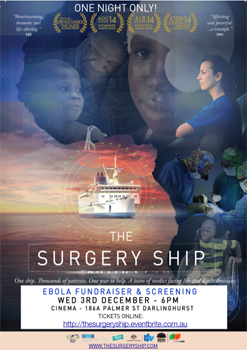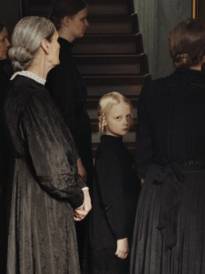The Surgery Ship

The Surgery Ship
Director: Madeleine Hetherton
Genre: Observational Documentary
Rated: M
Running Time: 78 minutes
Synopsis: Out on the ocean, a ship of doctors and nurses is traveling to the poorest of the poor living in West Africa. It carries life saving medical services for people who have none: children who suffer with terrible leg deformities, women outcast from their communities by birthing fistulas, vast tumors of all shapes and sizes which afflict the unlucky. With no medical help, sufferers must survive the best they can-unless the ship is in port.
The ship docks in a different country every year and people come from all corners of the globe. It is the last hope for so many – and if they miss the boat, there is no other chance.
On arrival, a flood of patients pours into the port, but in this medical lottery not everyone can win. For the lucky ones, doctors will carry out lifesaving operations on unbelievable cases. Many of these ills do not exist outside of West Africa and have never been seen before by these doctors.
Nonetheless, the volunteer medics must make on the spot life and death decisions. Some are too far-gone to treat, others not deemed severe enough-and the worst group are the patients in the middle, where the treatment may bring uncertain outcome, but no treatment means certain death. A confronting, complex journey for the volunteer doctors and nurses, it will be a case of life and death for many of the patients.
By the end it is not just the patients who are transformed. The young nurses and doctors will be challenged to the limits of their training and abilities. NERIDA is a young and idealistic yet inexperienced surgeon who will face a patient who cannot be fully cured. NEIL is mature doctor who has left his steady practise to go to one of the most out of control countries on earth. DAN will form an unexpectedly deep connection with a young child, whom he must leave at the end of the year in Guinea. Told through their eyes we follow the dramatic and confronting events as they unfold on the Surgery Ship.
The Surgery Ship
Release Date: December 3rd, 2015
Website: www.thesurgeryship.com
The Surgery Ship feature premiere & Ebola Fundraiser
Date: Wed 3rd December, 2014.
Venue: 186A Palmer St. Darlinghurst, Sydney
Time: 6.00pm for a 6.30pm start
Tickets are available online: https://thesurgeryship.eventbrite.com.au
Full $35 | Concession $20
Director's Statement
The Surgery Ship is a story about the incredible power of modern medicine and aid and at the same time, it's limitations. We live in a time of intense debate about the provision of medical services. Who should provide them? How should we pay for medicine? Who is entitled to medical aid? The story of a ship that travels the seas offering free medical help puts these questions into a savage new context.
West Africa shows us what life really means without access to the modern medicine we can take for granted. It's like stepping back in time to a world without modern surgery. Illnesses no longer seen in the developed West, flourish here and many will eventually kill.
This is a complex story about the difficulty of giving aid. Like the characters in the film, the ship presents as a powerful, well-equipped vessel with some of the world's best surgeons and support medics. Yet there are brutal limits to what it can achieve. No matter how much it does, the line of patients at its door is unending. So this is also a story about the ongoing quest to give aid and the impossibility of a quick fix in Africa.
The Surgery Ship is also a story about the intense ethical dilemmas faced by individual medics as they decide who they will help and who they will turn away, knowing that there is no-where else for these people to go.
Despite these complicated issues, The Surgery Ship is also a story about the everyday heroism of both Africans and the volunteers and the human drive to rise above circumstances, to survive, and give the best of ourselves - even when there seems no end in sight.
At its heart, this is a positive film, in it we see people as active agents in the broader world arena – people who are seeking to make a difference. It is an outward looking story about how we can engage with the world.
'One… should be able to see things as hopeless and yet be determined to make them otherwise" -F. Scott Fitzgerald
Why did I choose this story to tell?
In 2009 after a complicated pregnancy I gave birth to a very premature and sick baby. We were both lucky to survive. I recovered relatively quickly, but my son Zeke spent over a year in hospital struggling to breathe with lungs too small to support his body and badly damaged from both premature birth and the invasive measures taken to save his life. It was a long, dark journey punctuated by many terrifying admissions into intensive care where Zeke would barely hold onto his life, breath by breath. He was not expected to survive, yet somehow he did.
Over that time, we became very close to a number of doctors and nurses – one of them was a volunteer on the Africa Mercy hospital ship. My curiosity was awoken: What would life be like in a part of the world, which has almost no access to modern medicine? I had just come through an experience of intensive modern medicine and even with the most advanced of care, we had only just survived. What could it mean to live in a world where this was not available? Even in the very dark hours of intensive care, we did not fear that the medicine or care would suddenly stop or that advanced treatments were unavailable to my son. How would it be to live in a part of the world where doctors, drugs, expertise – even basic sanitation were simply a dream or images glimpsed on television, not a part of the reachable world?
I was particularly caught by the immensely difficult problem of choosing who would be helped and who would be turned away. The ship has extremely limited resources and part of it's success is that it will only take patients whom they have a very good chance of curing. They can help people with benign tumours, obstetric issues, orthopaedic, burns complications, eyesight and dental needs. But this is only a fraction of the need in West Africa
Many patients who have diseases that are routinely cured in the developed West are turned away. Although this makes sense from a pragmatic view of resources, my time in hospital painted all to vivid a picture of what the human and emotional toll this would take on the doctors and nurses. And my experience as a new mother told me all too well how it would feel for a parent to nurse a critically sick child – and to have no one to turn to for help.
Although West Africa, the languages and the culture are light years away from my life in Australia – I feel a deep personal connection to the struggle of both the ship volunteers and the patients to give and find healing for these children featured in The Surgery Ship.
‐ Madeleine Hetherton
Producer's Statement
For many years Madeleine and I had mooted the idea of collaborating and -doing it ourselves'. As friends and colleagues, discussions around the frustration of being a gun‐for-hire and the freelance life were always on the agenda. It was the perennial waiting for the right project to come along.
Then in amongst the chaos of Madeleine's first childbirth and the arrival of Zeke, an idea was also born… A film about a floating hospital, staffed by an international roster of volunteer surgeons and nurses from around the world, where they perform transformative and life saving surgery for the poorest of the poor. Who would have thought that whilst caring for her sick baby in hospital, Madeleine would find this story? The stars had aligned.
We knew from the outset that this one was a winner, so took the plunge and created our new company, Media Stockade. When Joseph Maxwell at SBS commissioned the film (his first commission on the job) we were on our way… And what an adventure it has been.
When we first formed Media Stockade we imagined our work to be provocative and socially relevant. To be entertaining but at the same time get people thinking. We wanted our films to move people – and inspire them to action and debate. The Surgery Ship represents all these things and it is with great pride that we launch her out into the world.
Along the way we have added new people to the Media Stockade team. Ester Harding has become an invaluable member bringing her producing and multiplatform skills to the company. Assistant Producer Paul Millgate; DOP Judd Overton, our French and Guinean crew on the ground, not to mention the numerous translators and the support crew from the Mercy Ship. Back home in the edit suite Andrea Lang cut up a storm and John Gray's music added a nuance to the work culminating to what has become a beautiful documentary. With the invaluable guidance of our mentor Mitzi Goldman and the expert eye of Joseph Maxwell, we have reached the finish line. It was at times an unwieldy family but somehow it worked.
The Surgery Ship is an important film. Important, because it shows us that as Australians we are adventurous, generous and participate in the world. We aren't just angry, racist and closed-minded (as we are more than occasionally portrayed).
The Surgery Ship reminds us how lucky we are and our responsibility to share that with the world. Through the work done onboard this ship we see the bravery and resilience of humans and our ability to connect in the most chaotic of environments.
Rebecca Barry
Production Stories
There were many memorable moments – some funny, some tragic.
Changing money for the first time in Guinea was a plunge into the reality of a galloping inflation rate! At the time we arrived, $1 AUD bought about 7000 Guinea Francs. The most common note in Guinea is the 5000GNF note – so when I went to pay our first months hotel accommodation, which was several thousand dollars – it turned out that their credit card facility was down. -For how long?' I asked. -We can't say' they told me. But the bill was due, so in search of cash withdrawal facilities went I. What I found was that although there are 3 banks with offices in Guinea, they are all local banks and cannot advance more than $20 USA without several weeks warning: the realities of a country where the average person lives on less than $2 per day.
Eventually, the only bank that could advance the money in the quantity we required was the ship bank! I walked out with about 14,000,000 GNF in cash. It was a heady feeling! The money took up several bags full which we accommodated in some white plastic grocery bags (doubled up for -security') and then caught the first taxi we could hail so I could get it back to the hotel cashier. My brief brush with multi-millionaire status was over!
It was also immensely strange to film people and whole scenes playing out in another language. This meant that frequently I had absolutely no idea what was being said. We just had to film these interactions in the hope that something relevant was going on and then check it with a translator after. Even then, things that I thought were great at the time turned out to be not so interesting later or some things that I thought were a complete flop turned out to be fascinating in the end.
I was very concerned that we go about getting access to the patients' side to the stories the right way. When we were trying to get access and permission from local Guinea people to film them on the ship, we were advised about the local customs of visiting. This basically amounts to arriving with about 10 kilos of rice and a couple of live chickens (live chickens are more expensive than dead ones because it means they are fresh). So many of our days started with the local market and trying to source these items at a reasonable price before any other work could take place.
Filming the Baby Amadou story was absolutely heart rending for me. It was early on in the filming and although I was expecting to come across some difficult stories, because his tumour looked very like some other tumours that had been successfully removed, I was kind of expecting the same for him. We were in the operating theatre and the biopsy results came back – I just felt like that proverbial saying, that the floor dropped away from me. I hadn't properly prepared myself for a less than good outcome. It was particularly complicated by the fact that he was a similar age to my own son at the time and that he was facing death by suffocation. My son had/has massive respiratory issues from his premature birth, so to find a story about a young child, also with life threatening respiratory issues was all very close to home - and it devastated me.
The Surgery Ship
Release Date: December 3rd, 2015
MORE



